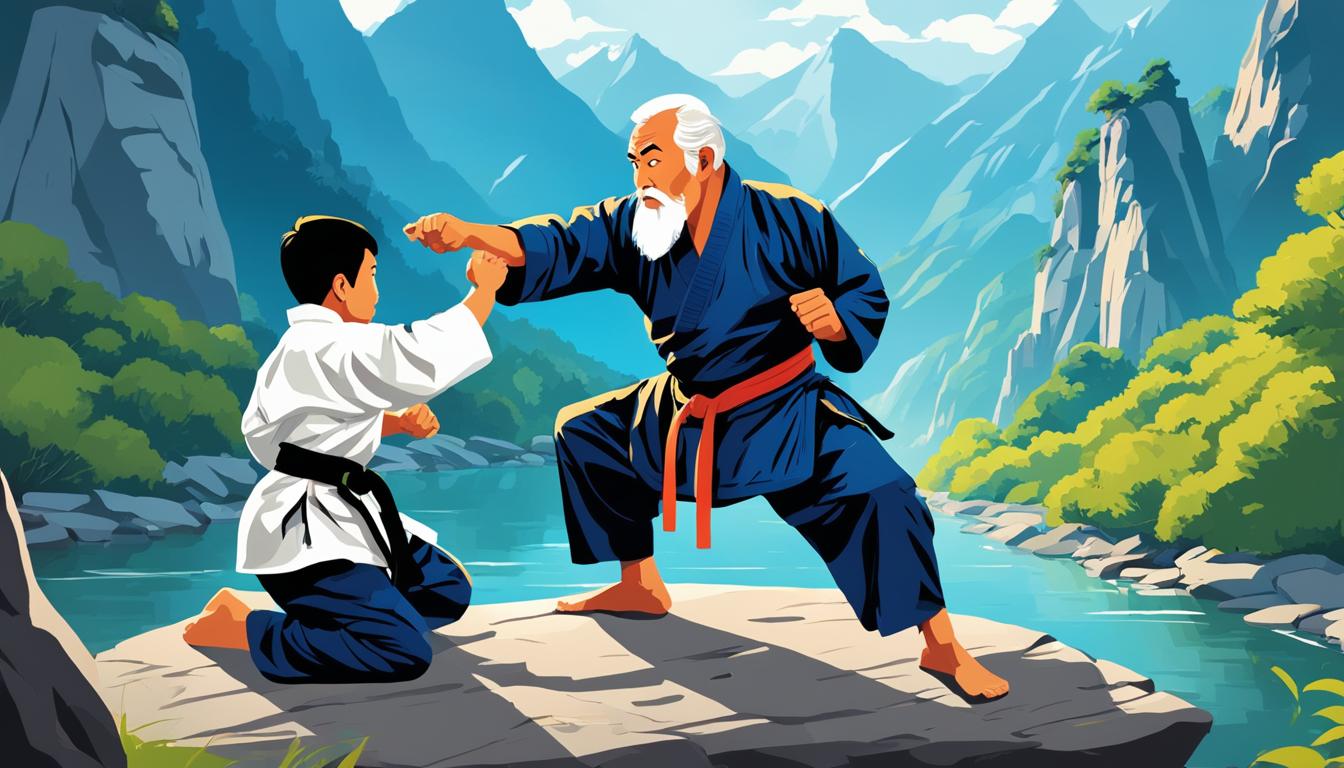Martial arts training has long been recognized as a valuable form of physical activity and self-defense. Many people believe that martial arts is only suitable for the young and agile, but is there really an age limit when it comes to martial arts? The answer is a resounding no.
Regardless of whether you’re in your 20s or your 70s, martial arts can offer a host of benefits at any age. It’s never too late to start your martial arts journey, even if you have no prior experience in the discipline. From improving physical fitness to boosting mental well-being, martial arts has something to offer individuals of all ages.
Key Takeaways:
- Martial arts is suitable for people of all ages, offering benefits regardless of age.
- Starting martial arts later in life is possible, even without prior experience.
- Physical benefits for older practitioners include increased muscle mass, improved flexibility, better balance, and enhanced cardiovascular fitness.
- Martial arts training contributes to better memory, increased brain capacity, and a strong mind-body connection.
- Emotional benefits include a decreased risk of depression, elevated mood, and increased socialization opportunities.
Can Older People Learn Martial Arts?
Many people wonder if there are age limitations or restrictions when it comes to learning martial arts, especially for older individuals. The truth is, age should never be a barrier to becoming a martial artist. Regardless of their age, anyone can start learning martial arts with the right training and guidance.
Self-defense classes and martial arts training can be particularly beneficial for older individuals, providing them with the skills and confidence to protect themselves in any situation. Whether they are 65 or even older, there are no age restrictions when it comes to embarking on a martial arts journey.
The Benefits of Martial Arts Training for Older Individuals
When older individuals engage in martial arts training, they can experience a wide range of physical, mental, and emotional benefits. This includes:
- Improved physical fitness: Martial arts training helps enhance muscle mass, flexibility, balance, physical stamina, cardiovascular fitness, and coordination in older individuals.
- Enhanced mental well-being: Learning martial arts stimulates the brain, improves memory, increases brain capacity, and fosters a strong mind-body connection.
- Emotional well-being: Martial arts classes trigger the release of endorphins, reducing the risk of depression and anxiety. Additionally, participating in martial arts provides opportunities for socialization and community building.
Overall, older individuals have the ability to learn martial arts and reap the numerous benefits associated with this ancient practice. Regardless of their age, they can embrace martial arts and embark on a fulfilling journey of self-improvement and personal growth.
Physical Benefits of Martial Arts for Older People
Martial arts training can have a significant impact on the physical fitness of older individuals, helping them combat the effects of aging and maintain a strong and healthy body. Engaging in martial arts practice provides numerous benefits that contribute to better overall physical well-being.
Improved Muscle Mass
One of the key physical benefits of martial arts for older people is the development of greater muscle mass. Through regular training, individuals can strengthen their muscles and improve their overall body composition. This increase in muscle mass not only enhances physical strength but also contributes to better posture and overall body balance.
Enhanced Flexibility and Balance
Flexibility and balance are essential for maintaining agility and preventing injuries, particularly as we age. Martial arts training incorporates stretching exercises and movements that promote flexibility and enhance balance. By regularly practicing martial arts, older individuals can improve their range of motion and reduce the risk of falls or other accidents.
Increased Physical Stamina
Participating in martial arts requires consistent physical exertion and endurance. As older individuals engage in regular training sessions, their physical stamina and endurance levels gradually improve. This increased stamina translates to enhanced energy levels throughout the day and improved overall physical performance.
Improved Cardiovascular Fitness
Martial arts training is an excellent way to improve cardiovascular fitness, as it involves dynamic movements and continuous physical activity. By engaging in martial arts practice, older individuals can enhance their cardiovascular health, boost their stamina, and reduce the risk of cardiovascular diseases.
Better Coordination
Martial arts training places a strong emphasis on precise and coordinated movements. By consistently practicing martial arts techniques, older individuals can improve their coordination skills. Enhanced coordination not only benefits martial arts practice but also translates to better motor skills and reduced risk of accidents in daily life.
Overall, martial arts training offers a range of significant physical benefits for older individuals. It supports the development of greater muscle mass, improved flexibility, better balance, enhanced physical stamina, improved cardiovascular fitness, and better coordination. Whether engaging in mixed martial arts, Brazilian jiu-jitsu, or Muay Thai, older individuals can enjoy the transformative effects of martial arts training on their physical well-being.
Mental Benefits of Martial Arts for Seniors
In addition to the physical benefits, martial arts training also provides numerous mental benefits for older individuals. Engaging in martial arts can have a positive impact on mental health and cognitive function, regardless of age. Let’s explore some of the mental benefits that seniors can gain from practicing martial arts.
Better Memory
One of the significant mental benefits of martial arts for seniors is improved memory. Martial arts training requires concentration, focus, and the memorization of techniques and forms. This mental stimulation helps to strengthen memory pathways and enhance overall cognitive function.
Increased Brain Capacity
Learning martial arts involves acquiring new skills, movements, and techniques. This process challenges the brain and promotes neuroplasticity – the brain’s ability to adapt and reorganize itself. As a result, the brain’s capacity increases, allowing seniors to maintain and improve their cognitive abilities.
Mind-Body Connection
Martial arts emphasizes the mind-body connection, promoting the integration of physical movements with mental awareness and control. Seniors who train in martial arts develop a heightened sense of body awareness, balance, and coordination. This connection between the mind and body not only enhances physical performance but also facilitates mental clarity and focus.
“Through martial arts, seniors can cultivate a strong mind-body connection, leading to improved overall well-being and quality of life.”
Incorporating martial arts training into their routine allows seniors to tap into these mental benefits and maintain their cognitive vitality. Whether it’s through forms, practice drills, or meditation techniques, martial arts offers a holistic approach to mental well-being.
Age should never be a barrier to experiencing the mental benefits of martial arts. By embracing the mind-body connection and engaging in regular training, seniors can sharpen their memory, expand their brain capacity, and achieve greater overall mental well-being.
Emotional Benefits of Martial Arts for Older People
Older individuals who engage in martial arts training can experience significant emotional benefits. Martial arts classes provide a full-body workout that triggers the release of endorphins, which are mood-elevating hormones. These endorphins can help decrease the risk of depression, elevate mood, and lower the risk of anxiety.
In addition to the physiological effects, martial arts training offers opportunities for socialization and the chance to meet new people. This can be especially valuable for older individuals who may face feelings of loneliness or isolation. By participating in martial arts classes, they can combat these negative emotions and find a sense of community.
Engaging in martial arts can be a source of emotional well-being for individuals of any age. The combination of physical activity, mental focus, and social interaction provides a holistic approach to improving emotional health. So, regardless of age, martial arts can be a powerful tool for enhancing emotional well-being and overall quality of life.


